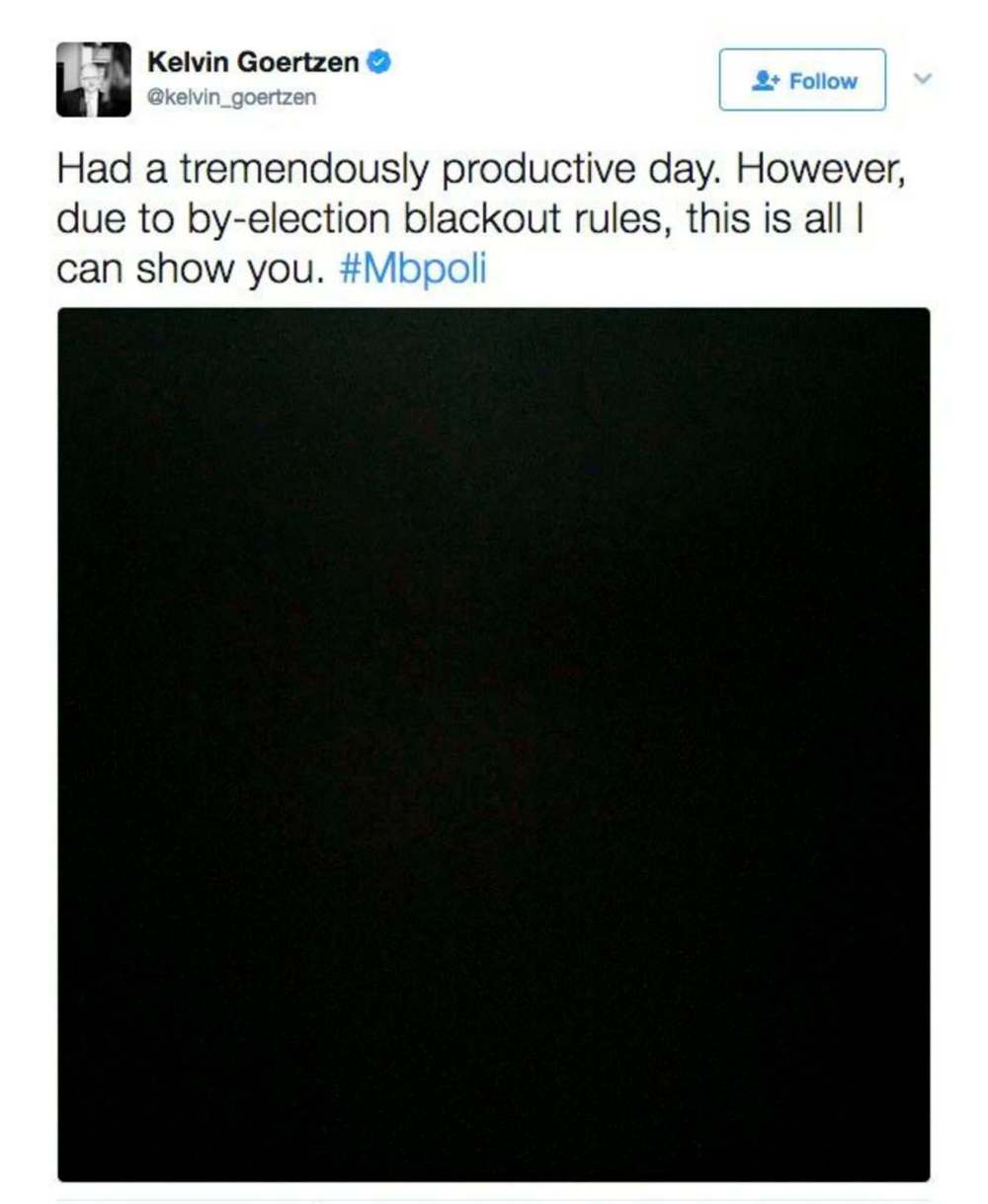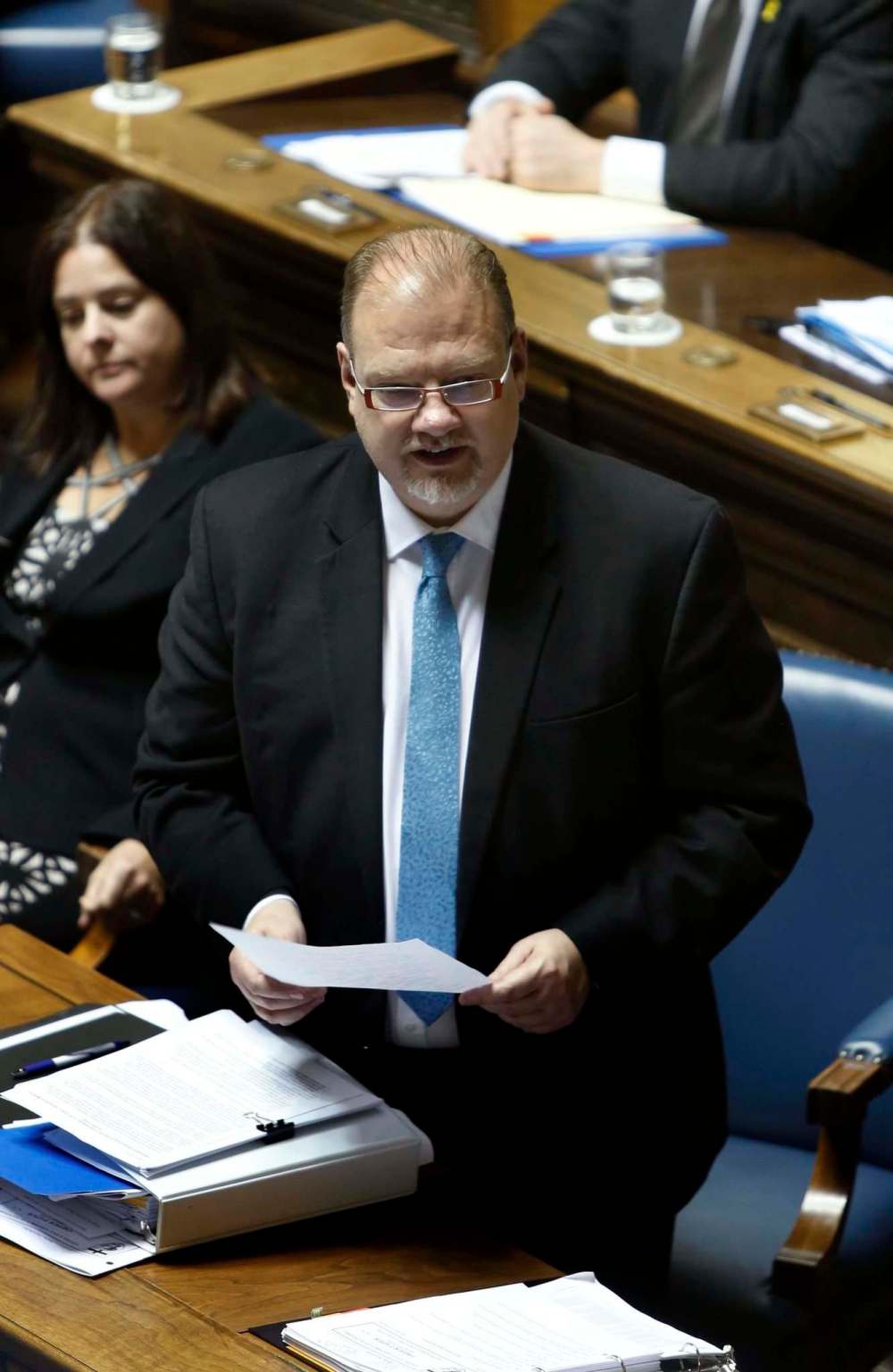Shining a light on election-blackout hypocrisy
Advertisement
Read this article for free:
or
Already have an account? Log in here »
To continue reading, please subscribe:
Monthly Digital Subscription
$0 for the first 4 weeks*
- Enjoy unlimited reading on winnipegfreepress.com
- Read the E-Edition, our digital replica newspaper
- Access News Break, our award-winning app
- Play interactive puzzles
*No charge for 4 weeks then price increases to the regular rate of $19.00 plus GST every four weeks. Offer available to new and qualified returning subscribers only. Cancel any time.
Monthly Digital Subscription
$4.75/week*
- Enjoy unlimited reading on winnipegfreepress.com
- Read the E-Edition, our digital replica newspaper
- Access News Break, our award-winning app
- Play interactive puzzles
*Billed as $19 plus GST every four weeks. Cancel any time.
To continue reading, please subscribe:
Add Free Press access to your Brandon Sun subscription for only an additional
$1 for the first 4 weeks*
*Your next subscription payment will increase by $1.00 and you will be charged $16.99 plus GST for four weeks. After four weeks, your payment will increase to $23.99 plus GST every four weeks.
Read unlimited articles for free today:
or
Already have an account? Log in here »
Hey there, time traveller!
This article was published 20/05/2017 (3125 days ago), so information in it may no longer be current.
Health Minister Kelvin Goertzen spoke volumes about the silliness that is baked into some of Manitoba’s election laws when he posted a dramatic image on his Twitter feed last week.
In the tweet, Goertzen noted he had enjoyed “a tremendously productive day. However, due to by-election blackout rules, this is all I can show you.”
The accompanying image was a big, black block. No photo, written words or image of any kind.

A frequently amusing presence in the Twitterverse, Goertzen’s post was a clear shot at Section 92 of the Election Financing Act, a provision that kicked into gear as soon as Premier Brian Pallister called a byelection in Point Douglas for June 13. It means that for the next four weeks or so, the government of the day must refrain from publishing, broadcasting or speaking in public about “its programs or activities.”
The blackout is in place for 90 days prior to an election or, in the case of a byelection, during the campaign period. There are exceptions for tenders, public-health notices and any matter relating to public safety. Ongoing, regular publications produced by the province are also exempt, along with any matter raised in the legislature.
Even so, those who work in government can tell you that Section 92 makes election campaigns stressful experiences, when even the most innocuous advertisement or announcement can spark a political headache.
The Tories have been in government for only a year, but they have intimate knowledge of the law’s potential for mischief. This is largely because, when they were in opposition, the Tories became experts at catching the NDP running afoul of Section 92. In some instances, the allegations were even true.
The best example of this was in 2009, when a former NDP cabinet minister announced a $50,000 contribution to renovate an agricultural exhibition facility in Brandon while two byelections were unfolding. The NDP was found guilty of violating Section 92, but given that there are no penalties prescribed in the legislation, they were able to shrug it off. And they won both byelections.
In other cases, however, the allegations have been more about generating a disparaging headline than enforcing some sort of principle of fairness during elections. Cases such as January 2013, when the NDP government promoted an event at the Manitoba Legislature to celebrate the 98th anniversary of the women’s suffrage movement. Despite the fact that this was hardly a partisan or political event, the province’s election commissioner found it to be in contravention of the law.
The reality is that a law intended to prevent a sitting government from gaining a political advantage by making an announcement immediately prior to or during an election period has morphed into an unreasonable and unrealistic prohibition on a wide range of government communications that don’t need to be prohibited.
While in government, the NDP came to loathe the Tories for their repeated claims under Section 92. Even so, the NDP never took steps to amend this provision, fearing they would be accused of giving themselves an unfair advantage during an election period. Now that they are in opposition, one might suspect the NDP would take a different tack on Section 92.
One would be wrong.
The NDP this past week filed a complaint with the chief electoral officer, alleging the Tories had violated Section 92 by releasing print and television ads explaining plans to close emergency departments in three Winnipeg hospitals. The ads advise Winnipeggers to be more discerning about visiting ERs; more than three-quarters of all patients presenting at ERs don’t really need emergency medicine.
The Tories said the deadlines for pulling some of the ads had passed when Pallister dropped the writ on the Point Douglas byelection last week. This caused the NDP to lash out with vindictive glee.
“This is a piece of propaganda that is being used by the government to try to justify their dynamic and horrible changes to the health-care system,” NDP MLA Andrew Swan told the legislature last week in question period.
Afterward, Mr. Pallister promised to “get to the bottom of it… and then we’ll take steps to make sure it’s corrected as fast as possible, if there is a violation of any kind.”
A quick study of the ads in question reveals that there is no political advantage. The government announced its plans more than six weeks ago. And given the outrage this idea has sparked in those communities slated to lose their ERs, there is an argument to be made that the Tories are at a political disadvantage by continuing to remind voters in Point Douglas about their plans.
No matter. It seems the NDP and Progressive Conservatives are happy to sustain this pointless law rather than working in concert to make it more realistic and fair.
That is particularly annoying because both parties understand Section 92 does give the government of the day an advantage, just not the one envisioned by the law.

Simply put, Section 92 can be cited by the government nearly as blanket immunity from answering difficult questions from media or the opposition. True to form, Pallister and his ministers began late last week to refuse to answer questions about potentially controversial policies, including an impending order to universities and colleges to cut management by 15 per cent.
Pallister raised the possibility of culling management ranks at post-secondary schools to mirror a similar edict given to core government and Crown agencies. However, when pressed on the specifics, Pallister claimed he could not elaborate because of the election publication ban. The same excuse was used by Heritage Minister Rochelle Squires, who was asked in question period about possible funding cuts to northern museums.
“I will not do that today because we are in blackout,” Squires said.
The NDP immediately accused the Tories of misusing Section 92 to avoid answering questions in the legislature, which is permitted under the law.
“There’s nothing preventing the minister from answering a question,” Swan said.
The hypocrisy on both sides of this equation is stunning. Just two years ago, it was the NDP misusing Section 92 to frustrate journalists, with the Tories calling foul.
Goertzen, his party’s house leader when in opposition, said back in 2015 the NDP government was abusing Section 92 to avoid facing questions from news organizations.
“Personally, I think they are looking at the act too narrowly,” he told the Free Press. “We need to sit down with the election commissioner and the various parties and discuss whether this act is doing what it was supposed to be doing.”
Now that he is in government, perhaps Goertzen can start the ball rolling and assemble an all-party committee to discuss more reasonable restrictions on government communication during a writ period. Most people who understand this flawed law know that it puts unrealistic limits on what a government can say and do. They also know that it can be misused as an excuse to refuse to answer pressing questions.
Change is needed. The Tories know this. And so does the NDP.
On the other hand, we could just keep the law as is and learn to be satisfied that all we’re going to get from the government during election periods are mildly amusing but deliberately vague tweets.
dan.lett@freepress.mb.ca

Born and raised in and around Toronto, Dan Lett came to Winnipeg in 1986, less than a year out of journalism school with a lifelong dream to be a newspaper reporter.
Our newsroom depends on a growing audience of readers to power our journalism. If you are not a paid reader, please consider becoming a subscriber.
Our newsroom depends on its audience of readers to power our journalism. Thank you for your support.

